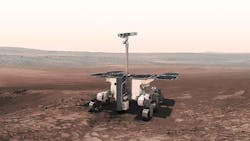Money Troubles May Delay Europe-Russia Mars Mission
PARIS—Part of a joint European-Russian mission to search for signs of life on Mars may be delayed due to cash flow problems, the European Space Agency said Friday.
"We need some more money," ESA director general Jan Woerner told journalists in Paris, citing project cost increases.
The ExoMars project is scheduled to kick off in March this year with the launch of an orbiter, due to arrive at the Red Planet six months later.
The second part entails the planned launch of a rover in 2018, to touch down the following year.
But the timeframe for the second leg has become "a challenge," said Woerner.
"So far, we are still planning to have the 2016 mission, as I said... and we will have the 2018 mission later on.
"If we cannot get the (20)18 mission on time, this is not as dramatic as it sounds," he said, and would mean a two-year delay.
Woerner said he did not know how much money was needed, but the amount would be revealed to ESA's member nations "very soon".
The mission's objective is to search for signs of Martian life--past or present.
The orbiter will seek to detect atmospheric traces of methane and other gases that would point to the existence of microbes.
The rover, in turn, will drive over the Red Planet in search of organic matter -- drilling up to two meters deep for samples and analyzing them on site.
"It's a thrill. It's really a very nice opportunity to see whether we find some organic material down in the soil or whatever is there," said Woerner.
"I hope that everything goes well and that we will have this rover on Mars either in 2018, preferably, or later on. But it's important because then we can say more about what is happening on Mars, or what happened on Mars."
ESA has a total budget of 5.25 billion euros ($5.75 billion) for 2016, up from 4.4 billion euros the previous year.
Woerner defended the money spent on space exploration.
"I hate this defensive position we always have to take, therefore I would like to tell you space is not expensive. Space is very cheap."
ESA's space programs cost the equivalent of 10 liters of petrol per European citizen per year, satellite navigation about one beer per person, and human space flight about one metro ticket per person per year, he said.
Copyright Agence France-Presse, 2016
About the Author
Agence France-Presse
Copyright Agence France-Presse, 2002-2025. AFP text, photos, graphics and logos shall not be reproduced, published, broadcast, rewritten for broadcast or publication or redistributed directly or indirectly in any medium. AFP shall not be held liable for any delays, inaccuracies, errors or omissions in any AFP content, or for any actions taken in consequence.
